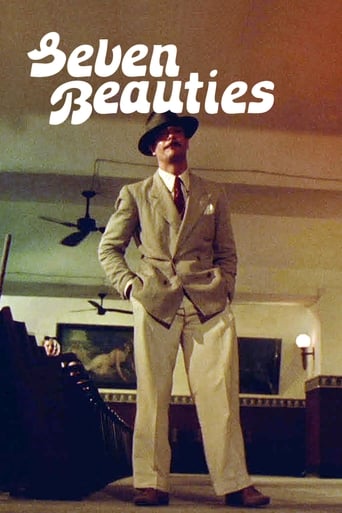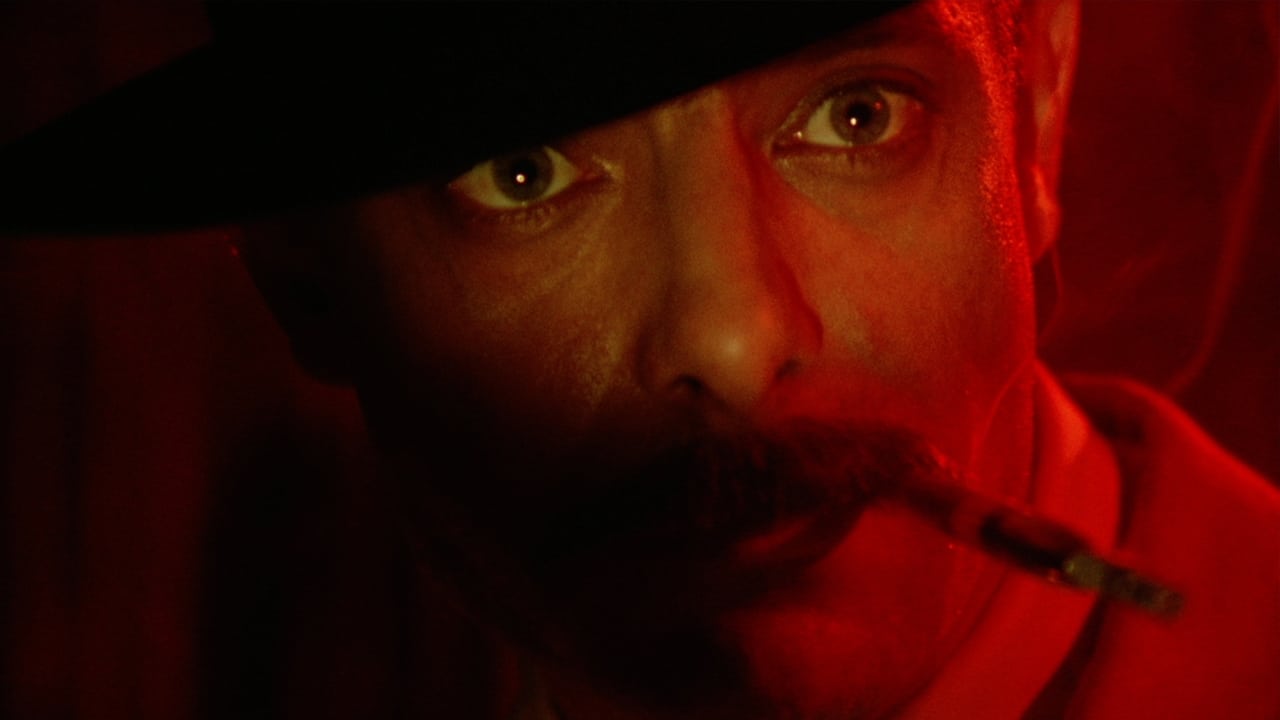Zoomorph
This film deals with idealism vs. pragmatism. The main character starts off deeply caring about his honor, then gradually gives it all up until he becomes a prostitute for the Nazis and complies in killing his friend for his own survival. Several of his peers retain their ideals, refuse to submit, and die pathetic deaths.The film seems to be admitting a harsh truth of reality: that life is ultimately about survival and that ideals and thoughts are not important beyond how they influence our actions. At some point they hold us back and we're better off abandoning them.At one point the Nazi female commander laments that the Nazis are trying to make humanity better but doomed to fail, and the snivelling rats who will do anything to survive (the main character) will continue on. This is a good point. The Nazis were idealistic too in wanting to elevate humanity.So the film isn't on the side of idealism or pragmatism. Clearly humanity is a complex combination of both; every person has some degree of fundamental ideals and some degree of flexibility and pragmatism. And there are many different ideals that are in opposition to one another.One of the idealist characters at one point mentions a possible resolution that is popular: for humans to turn into sheep. If we can only stop evolution and eliminate violence from the world, we can live happily ever after.The film is otherwise lacking in insight. It's not clear what it views as a resolution. It does seem clear that the film isn't happily embracing the world as it is, give its sombre tone.The film starts out with a montage of stock footage of Hitler and Mussolini set to cartoonish music and a voice narrating some phrases that sound like they're probably insulting. A short ways in, we see evil Nazis shooting innocent women and children in the forest. At one point, the dialogue is set up for one character to defend Mussolini and another, wiser character to rebut all of their arguments and explain why Mussolini was bad. Finally, the characters end up in a concentration camp where evil Nazis shoot innocent prisoners for no reason. Who knows what the director really believes - she isn't telling us - but the apparent heavy anti-Nazi, Nazis-are-pure-evil bias of the film is annoying.The film is otherwise fairly mediocre. Far from a masterpiece. It's an odd mixture of genres. Not very funny. The best thing about it is probably the excellent acting of the main character.
apzijlstra
Editing, acting, lighting, pacing, they're all very good. The mix of genres makes me wonder. That something funny if not farcical is mixed in with the tragedy of WWII doesn't sit well with me, although I know that some will say that it is the crux. The best part of the movie was perhaps the introduction, the Oh, Yeah part. The scene wherein the two deserters come upon the mass execution has a beautifully grim and nightmarishly terrifying aspect. The whole movie has something of a bad dream, not in the least because of the seemingly realistic scenes which never could have happened and the use of black and white scenes that convey a sense that we have to do with a documentary. Surely, the director is, as Ingmar Bergman said, the magician, and if so, if the audience is being set up, it's only part of the show.
tieman64
"Seven Beauties" opens with a strange sequence. Over horrific WW2 documentary footage, a character called Pasqualino Settebellezze recites a monologue, pausing every now and then to say "oh yeah" in a rather kinky voice, whilst overly romantic jazz music more suited to a low budget porn movie plays bombastically in the background.Sex, violence and self-preservation, these are the themes this introductory sequence lays down, all of which director Lina Wertmuller will approach from various angles over the next hour and a half.The film then unfolds in non-linear fashion. We see Pasqualino and his companion bumbling through a forest. Having long deserted the Italian army, they are tired and dirty, desperate for a meal. It is then that the pair witness a massacre, the German army rounding up a crowd of Jews, ordering them to get naked and then mercilessly gunning them down. The two men then have a short debate. Was it their moral imperative to intervene? Would their intervention have been useless? Is running away morally reprehensible?As the film progresses, director Lina Wertmuller increasingly argues that running away is merely a form of prostitution, the survivor selling his/her humanity for survival. Self-interest, she says, is both human nature and a form of exploitation. Paradoxically, it is this self-interest – the need to survive – which causes atrocities and enables bloodshed to continue. Those who run, in other words, support the war machine. Are complicit in its smooth efficiency.The film then jumps back in time. Pasqualino is re-introduced to us a dashing and debonair playboy who has a gift for seducing ladies. He wears a flashy suit, is always well groomed and struts about like a womanising Don Juan. But of course Pasqualino is a fraud, always showing off in an attempt to hide his own poverty. To him, appearances are everything. As such, Pasqualino is obsessed with protecting his seven ugly sisters (the seven beauties of the title), who are so desperate for money that they whore themselves out as strippers and prostitutes. Pasqualino deplores their behaviour. How dare they dishonour the family name! How dare they take part in such filth! This section of the film is thus a sort of darkly comic, domestic fairytale, the younger brother defending his older, quite unattractive sisters, against the onslaught of disrespect posed by everybody in the village. But once Pasqualino pulls a gun on a local pimp (for insulting his sister), the film shifts gears and becomes a dark tale of survival. Pasqualino goes on the run from the law, chops a body into little pieces and engages in all manners of theft, rape and pillage, all in the name of survival. The very man who condemned others for prostituting their bodies, becomes a whore to the world, doing every despicable act required to ensure his continued existence.The last half of the film literalizes these themes further. Pasqualino is captured and placed in a German concentration camp run by an evil female camp commandant (Shirly Stoler in the role that made her famous). Trapped in the camp and fearing for his life, Pasqualino must use his skills as a womaniser to seduce this embodiment of evil. And so, in one long sequence that is as funny as it is gross, Pasqualino flirts, seduces and makes love to the camp commander. The last shreds of his dignity are instantly evaporated.The film ends with Pasqualino in Italy, offering his hand in marriage to a young woman. She agrees, at which point he promptly discusses the prospect of having babies. Pasqualino wants countless children. Why? Because only through them can he ensure his survival. And so, quite despicably, life has once again found a way.Of course on another level, one can also look at Pasqualino as Italy personified, the country selling her soul to fascism in the name of personal survival. Incidentally, with "Seven Beauties" Wertmuller also continues her trend for inserting veiled (anti?) feminist statements in her films. The piggish camp commander is a jab at the kind of man-hating "strong women" who set the agenda for female equality by demeaning and undermining others. She's no better than the patriarchal power players she despises.8.5/10 - The Italians made the best Holocaust films. Unlike the "Allied Nations", they experienced the Holocaust's horrors first hand, participated in its evils, and possessed the right mixture of blame, introspection, anger and disgust to represent the event truthfully. The Germans, swathed with guilt, couldn't even approach the topic until a good half a century later (until recently, Holocaust movies have come out of every country BUT Nazism's country of origin). Scapegoated and demonized, international pressure coupled with their own insecurities, Germany was prevented from seeing itself as anything other than one dimensional "bad guys".Note: This film was a huge influence on Italian filmmakers. Roberto Benigni's "Life is Beautiful" rips this picture off shamelessly whilst Coppola would base his "Ride of the Valkyries" sequence in "Apocalypse Now" on the "Ride of the Valkyries" sequence in this film. More interesting Holocaust films: "Korczak", "The Garden of Finzi Continis", "Border Street", "Diamonds of the Night", "Europa Europa", "Fateless", "The Last Stop", "The New Land", "Passenger", "The Pianist", "The Pawnbroker", "The Wannsee Conference", "The Shop On Main Street", "The Boat is Full".
Eumenides_0
Lina Wertmüller's cinema remained unknown to me until I watched Pasqualino Settebellezze, but now I can say she has made one of the finest movies I've ever seen. She's succeeded in creating an unforgettable character, Pasqualino, a lovable rogue, and give one of the most cynical and funniest looks at human nature and at Man's will to survive.Giancarlo Giannini plays Pasqualino, a Neapolitan crook who wants to make a name for himself and protect the honour of his household composed of his mother and several sisters. When one of his sisters becomes a prostitute he kills her pimp and disposes of the body in a creative way: by hacking it into three pieces and shipping each one to a different city. The inexperience Pasqualino is caught, but the "Monster of Naples" fakes madness and gets sent to an asylum. Then with WWII starting, he manages to get recruited just so he can desert. Only he deserts in the middle of Germany and gets taken to a concentration camp where he seduces the sadistic Kapo in return for favours.This movie is undoubtedly a comedy, the black, misanthropic type that revels in making fun of everything that's rotten and horrible in people. Pasqualino's will to live to would bring to one's mind movies like The Pianist or Life Is Beautiful, hymns to human hope, if it weren't for the fact Pasqualino is a manipulative bastard who'll do anything – really anything – to survive. In a way this movie is also a parody of such feel-good movies. Wertmüller peels down the layers of the hero to show that behind all that willpower, all that nobility there's just a rat trying to survive.Like the Nazi Kapo says to Pasqualino, "You're a sub-human creature who'll survive, while we tried to create the master race and are doomed". And yet Giannini, who gives a marvellous performance, never makes his character unlikable. From the first time we see him wearing a dead man's bloodied bandages to fake a wound, to strutting through the streets of Naples like a peacock, to debasing himself before the Kapo in return for food, we're captivated by his performance.If you ever need to remind yourself what a sad, pathetic species we are, watch Pasqualino Settebellezze and marvel how all the lies that hide our true nature are torn apart to reveal our true spirit.


 AD
AD



